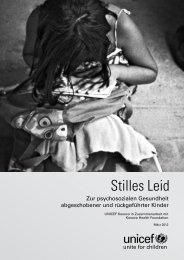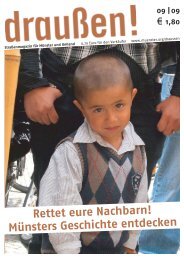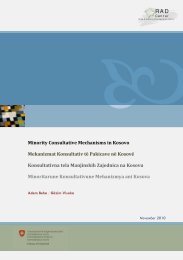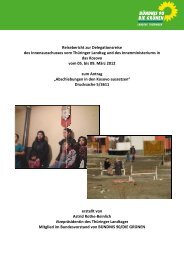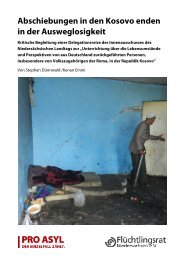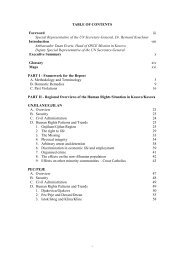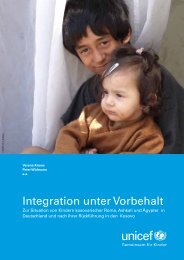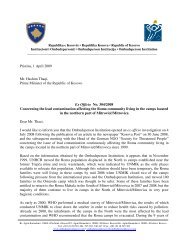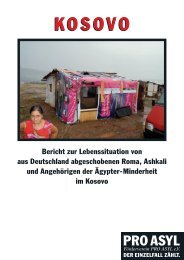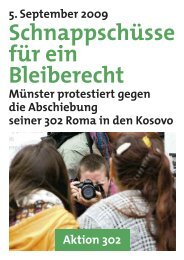OF THE READMISSION AGREEMENTS Analysis of the ... - Aktion 302
OF THE READMISSION AGREEMENTS Analysis of the ... - Aktion 302
OF THE READMISSION AGREEMENTS Analysis of the ... - Aktion 302
You also want an ePaper? Increase the reach of your titles
YUMPU automatically turns print PDFs into web optimized ePapers that Google loves.
4ACCESS TO RIGHTS AND INTEGRATION <strong>OF</strong> RETURNEES ON <strong>THE</strong> BASIS
<strong>Analysis</strong> <strong>of</strong> <strong>the</strong> main problems and obstacles 5INTRODUCTIONThe gravest problems that <strong>the</strong> returnee population is facing appear in <strong>the</strong> areasidentified as a priority also in <strong>the</strong> 2009 Strategy for <strong>the</strong> Reintegration <strong>of</strong> Returnees on<strong>the</strong> basis <strong>of</strong> <strong>the</strong> Readmission Agreements. These are: access to personal documentsand registration <strong>of</strong> permanent and temporary residence, education, employment,health care and social protection, and housing.In addition to <strong>the</strong> returnees on <strong>the</strong> basis <strong>of</strong> <strong>the</strong> readmission agreements, <strong>the</strong>re are o<strong>the</strong>rcategories <strong>of</strong> population in Serbia such as <strong>the</strong> displaced persons and <strong>the</strong> members <strong>of</strong>Roma ethnic minority who are in an extremely difficult situation and whose successfulsocial inclusion depends on removal <strong>of</strong> obstacles in <strong>the</strong> aforementioned areas.Bearing in mind that Roma constitute <strong>the</strong> majority <strong>of</strong> <strong>the</strong> returnee population, Praxislaunched a Swedish Migration Board – funded project Contribution to Sustainability <strong>of</strong>Return <strong>of</strong> Roma from Sweden and O<strong>the</strong>r Countries in Europe to Serbia in September 2010.The aim <strong>of</strong> <strong>the</strong> project was to raise awareness and empower returnees on <strong>the</strong> basis <strong>of</strong><strong>the</strong> readmission agreements, voluntary returnees and <strong>the</strong> general Roma populationin Serbia to access <strong>the</strong>ir rights, protect <strong>the</strong>m and to fully involve <strong>the</strong>mselves in <strong>the</strong>Serbian society. At <strong>the</strong> same time, <strong>the</strong> aim <strong>of</strong> <strong>the</strong> project was to inform <strong>the</strong> relevantstakeholders at <strong>the</strong> national and local level about <strong>the</strong> problems <strong>the</strong> above mentionedgroups faced, and to encourage <strong>the</strong>m to cooperate in facilitating <strong>the</strong> access <strong>of</strong> all<strong>the</strong>se groups to <strong>the</strong>ir fundamental rights.To this effect, Praxis convened meetings with <strong>the</strong> representatives <strong>of</strong> local authorities,service providers and representatives <strong>of</strong> <strong>the</strong> Roma community on <strong>the</strong> territory <strong>of</strong>ten municipalities 1 throughout Serbia. Within this and also its o<strong>the</strong>r projects, Praxisvisited a total <strong>of</strong> 120 Roma settlements, where it organised informative and trainingsessions for more than 3,200 participants, returnees and o<strong>the</strong>r members <strong>of</strong> <strong>the</strong> Roma1Zrenjanin, Vrsac, Palilula, Novi Beograd, Pozarevac, Kragujevac, Kraljevo, Novi Pazar, Vranje, Bujanovac
6ACCESS TO RIGHTS AND INTEGRATION <strong>OF</strong> RETURNEES ON <strong>THE</strong> BASISpopulation with a view to raising awareness and building <strong>the</strong>ir capacity to access <strong>the</strong>basic social and economic rights and combat discrimination. These sessions also servedto inform <strong>the</strong> Roma population about <strong>the</strong> rights and obligations arising from <strong>the</strong> visafreeregime and impossibility <strong>of</strong> being granted asylum for economic reasons.In addition, Praxis provided free legal aid, counselling and information about accessto personal documents, registration into registry books in Serbia, registration <strong>of</strong>permanent and temporary residence and access to <strong>the</strong> basic social and economic rights(right to education, employment, accommodation, health care, social protection etc.)to more than 224 returnees. The majority <strong>of</strong> persons assisted in this way have beenreturned from Norway, Germany and Sweden.Praxis also participated in <strong>the</strong> meetings <strong>of</strong> <strong>the</strong> Team for Monitoring <strong>the</strong> Implementation<strong>of</strong> <strong>the</strong> Strategy for Reintegration <strong>of</strong> Returnees on <strong>the</strong> basis <strong>of</strong> <strong>the</strong> ReadmissionAgreements, highlighting problems identified in working with returnees, andproviding recommendations for <strong>the</strong>ir removal.After <strong>the</strong> completion <strong>of</strong> <strong>the</strong> project, Praxis organised a roundtable entitled Access toRights and Integration <strong>of</strong> <strong>the</strong> Returnee Population into <strong>the</strong> Society in Belgrade. The aim<strong>of</strong> <strong>the</strong> roundtable was to ga<strong>the</strong>r <strong>the</strong> relevant stakeholders dealing with integration <strong>of</strong>returnees on <strong>the</strong> basis <strong>of</strong> <strong>the</strong> readmission agreements at <strong>the</strong> local and national level,and to facilitate discussion and exchange <strong>of</strong> information and experiences. In orderto contribute to integration and social inclusion <strong>of</strong> <strong>the</strong> returnee population on equalterms, <strong>the</strong> participants <strong>of</strong> <strong>the</strong> roundtable agreed on <strong>the</strong> guidelines for <strong>the</strong> future workin facilitating <strong>the</strong>ir access to <strong>the</strong> basic rights.The objective <strong>of</strong> this publication is to present <strong>the</strong> problems, which <strong>the</strong> returnees and<strong>the</strong> Roma population in general in Serbia are facing, through practical examples, toreview <strong>the</strong> possibilities that <strong>the</strong> existing legal system and <strong>the</strong> system <strong>of</strong> social network<strong>of</strong>fer in resolving <strong>the</strong>m and to consider <strong>the</strong> consequences that <strong>the</strong> neglect <strong>of</strong> <strong>the</strong>seproblems may have on exercise <strong>of</strong> <strong>the</strong> basic rights <strong>of</strong> returnees and <strong>the</strong>ir successfulsocial inclusion. The publication will also propose guidelines for future acting inintegration <strong>of</strong> returnees, resulting from <strong>the</strong> work <strong>of</strong> Praxis with this population andfrom cooperation with <strong>the</strong> representatives <strong>of</strong> state institutions at national and locallevel and non-governmental organisations working with returnees and members <strong>of</strong><strong>the</strong> Roma community.
<strong>OF</strong> <strong>THE</strong> <strong>READMISSION</strong> <strong>AGREEMENTS</strong> <strong>Analysis</strong> <strong>of</strong> <strong>the</strong> main problems and obstacles 7ROMA IN <strong>THE</strong> PROCESS <strong>OF</strong><strong>READMISSION</strong>As far back as in 2003, <strong>the</strong> Council <strong>of</strong> Europe stressed that, according to <strong>the</strong> estimates,50,000 to 100,000 Roma from Serbia and Montenegro including Kosovo, were stillliving in various European states without permanently legalised status. 2 According to<strong>the</strong> 2010 Report <strong>of</strong> <strong>the</strong> Commissariat for Refugees <strong>of</strong> <strong>the</strong> Republic <strong>of</strong> Serbia and <strong>the</strong>Office for Readmission, <strong>of</strong> 1,164 persons were returned through <strong>the</strong> Belgrade “NikolaTesla“ Airport that year, 632 were Roma. The reports <strong>of</strong> <strong>the</strong> Office for Readmissionfor <strong>the</strong> first six months <strong>of</strong> 2011 also indicate that Roma continue to represent <strong>the</strong>majority <strong>of</strong> returnee population. 3The Strategy for <strong>the</strong> Reintegration <strong>of</strong> Returnees on <strong>the</strong> basis <strong>of</strong> <strong>the</strong> ReadmissionAgreement identified persons <strong>of</strong> Roma ethnicity as a “group exposed to <strong>the</strong> specialrisk in <strong>the</strong> process <strong>of</strong> return“. On <strong>the</strong> o<strong>the</strong>r hand, <strong>the</strong> Strategy for Improvement <strong>of</strong> <strong>the</strong>Status <strong>of</strong> Roma in <strong>the</strong> Republic <strong>of</strong> Serbia also identified returnees under readmissionagreements as a particularly vulnerable category among <strong>the</strong> Roma communityrequiring special attention in <strong>the</strong> process <strong>of</strong> developing measures for improvement <strong>of</strong><strong>the</strong> overall situation <strong>of</strong> Roma. Both <strong>of</strong> <strong>the</strong> above stated documents indicate that <strong>the</strong>position <strong>of</strong> Roma returnees cannot be observed without comprehending <strong>the</strong> position<strong>of</strong> <strong>the</strong> entire Roma population in Serbia.According to <strong>the</strong> 2002 Civic Census, <strong>the</strong>re are some 108,193 persons <strong>of</strong> Roma ethnicityin Serbia. The estimated figures are much higher and range between 250,000 and500,000. 4 The absence <strong>of</strong> accurate statistics may be ascribed to <strong>the</strong> frequent migrations2Recommendation No. 1633 <strong>of</strong> <strong>the</strong> Council <strong>of</strong> Europe on <strong>the</strong> issue <strong>of</strong> forced returns <strong>of</strong> Roma fromformer FRY, including Kosovo and Metohija, to Serbia and Montenegro from <strong>the</strong> Council <strong>of</strong> EuropeMember States3Of 81 returnees in January 2011, 59 were Roma. Of 128 returnees in March 2011, 104 were Roma. Of92 returnees in June 2011, 74 were Roma.4Strategy for Improvement <strong>of</strong> <strong>the</strong> Status <strong>of</strong> Roma in <strong>the</strong> Republic <strong>of</strong> Serbia
8ACCESS TO RIGHTS AND INTEGRATION <strong>OF</strong> RETURNEES ON <strong>THE</strong> BASIS<strong>of</strong> Roma, but also to <strong>the</strong> fact that some <strong>of</strong> <strong>the</strong>m have not been registered in <strong>the</strong> birthregistry book, have no registered permanent residence and do not possess ID cards.The new civic census, planned for <strong>the</strong> first half <strong>of</strong> 2011, was postponed for <strong>the</strong> end <strong>of</strong><strong>the</strong> year. The number <strong>of</strong> Roma is expected to be more accurate after this census.It is exactly because <strong>of</strong> <strong>the</strong> everyday problems <strong>the</strong>y face that Roma most <strong>of</strong>ten decideto leave <strong>the</strong> country. Poverty, high unemployment rate, low level <strong>of</strong> education, lack<strong>of</strong> housing, inadequate health care and social protection, lack <strong>of</strong> personal documents,discriminatory proceeding by <strong>the</strong> State and <strong>the</strong> majority population create anenvironment not conducive to enjoyment <strong>of</strong> fundamental human rights. It is in suchan environment that <strong>the</strong> returnees - particularly those who have spent several yearsin <strong>the</strong> Western European countries and got used to a high quality life and enjoyment<strong>of</strong> fundamental human rights - are unable to find <strong>the</strong>ir way and to integrate into <strong>the</strong>society quickly and efficiently. Secondary migrations are also a frequent consequence<strong>of</strong> this.
<strong>OF</strong> <strong>THE</strong> <strong>READMISSION</strong> <strong>AGREEMENTS</strong> <strong>Analysis</strong> <strong>of</strong> <strong>the</strong> main problems and obstacles 9LEGAL AND INSTITUTIONALFRAMEWORK FOR INTEGRATION <strong>OF</strong>RETURNEESSerbia signed <strong>the</strong> Agreement on <strong>the</strong> Readmission <strong>of</strong> Persons Residing withoutAuthorisation with <strong>the</strong> European Community in 2007 and committed itself toreception <strong>of</strong> its nationals and <strong>of</strong> third country nationals who resided on <strong>the</strong> territory <strong>of</strong><strong>the</strong> European Community, and who do not fulfil or who no longer fulfil conditions forresidence on <strong>the</strong> territory <strong>of</strong> <strong>the</strong> European Community. In addition to this Agreement,Serbia also signed bilateral readmission agreements with numerous states. 5There is no single legally binding act regulating <strong>the</strong> status <strong>of</strong> returnees in Serbia. TheAgreement with <strong>the</strong> European Community and <strong>the</strong> bilateral agreements are <strong>the</strong> onlylegally binding documents relating to returnees.In its 2003 Recommendation on <strong>the</strong> Issue <strong>of</strong> Forced Returns <strong>of</strong> Roma from <strong>the</strong>Former Federal Republic <strong>of</strong> Yugoslavia, <strong>the</strong> Council <strong>of</strong> Europe expressed concern for<strong>the</strong> situation which Roma returned from <strong>the</strong> countries <strong>the</strong>y had lived in for yearswere faced with upon being returned to Serbia. Of <strong>the</strong> numerous recommendationsmade by <strong>the</strong> Council <strong>of</strong> Europe to Serbia, <strong>the</strong> following are <strong>the</strong> most relevant: to giveparticular attention to Roma, who constitute <strong>the</strong> poorest category in <strong>the</strong> vulnerablegroups in <strong>the</strong> forthcoming governmental Poverty Reduction; to urgently identifylegally binding measures with an aim <strong>of</strong> preventing statelessness (situation <strong>of</strong>persons without citizenship) <strong>of</strong> Roma returnees, and in particular to ensure that <strong>the</strong>local authorities carry out <strong>the</strong> procedures required for issuance <strong>of</strong> personal documents;to facilitate access to public services relevant to exercise fundamental human rights;to speed up and facilitate <strong>the</strong> provision <strong>of</strong> school attendance certificates for childreneducated abroad; to ensure catch-up classes <strong>of</strong> <strong>the</strong> Serbian language for returneechildren; to ensure that no ethnic segregation arises in <strong>the</strong> provision <strong>of</strong> schooling forreturnee children.5Germany, Sweden, Denmark, Italy, Belgium, The Ne<strong>the</strong>rlands, Luxembourg, Austria, Slovakia, Bulgaria,France, Hungary, Slovenia, Croatia, Bosnia and Herzegovina, Switzerland, Canada, Norway and Romania
10ACCESS TO RIGHTS AND INTEGRATION <strong>OF</strong> RETURNEES ON <strong>THE</strong> BASISThe first steps in <strong>the</strong> process <strong>of</strong> returnee integration were made in February 2009 when<strong>the</strong> Strategy for Integration <strong>of</strong> Returnees on <strong>the</strong> basis <strong>of</strong> <strong>the</strong> Readmission Agreementswas adopted. The Strategy invokes international standards set in numerous humanrights instruments ratified by Serbia such as <strong>the</strong> International Covenant on Economic,Social and Cultural Rights, International Convention on Elimination <strong>of</strong> All Forms<strong>of</strong> Racial Discrimination, Convention on <strong>the</strong> Rights <strong>of</strong> <strong>the</strong> Child and <strong>the</strong> EuropeanConvention for <strong>the</strong> Protection <strong>of</strong> Human Rights and Fundamental Freedoms as basesfor proposal <strong>of</strong> measures contained <strong>the</strong>rein. Fur<strong>the</strong>rmore, <strong>the</strong> Strategy provides forestablishment <strong>of</strong> an institutional framework for reintegration <strong>of</strong> returnees, creation<strong>of</strong> conditions for <strong>the</strong>ir primary reception and capacity building <strong>of</strong> local communitiesfor <strong>the</strong>ir reintegration into society.The Strategy identified <strong>the</strong> key institutions in <strong>the</strong> process <strong>of</strong> returnee reintegration:Council for Integration <strong>of</strong> Returnees on <strong>the</strong> basis <strong>of</strong> <strong>the</strong> Readmission Agreements,being an expert and advisory body <strong>of</strong> <strong>the</strong> Government; <strong>the</strong> Strategy ImplementationMonitoring Team, being a coordinating body in charge <strong>of</strong> implementation <strong>of</strong> <strong>the</strong>strategic objectives and <strong>the</strong> Commissariat for Refugees <strong>of</strong> <strong>the</strong> Republic <strong>of</strong> Serbia.The Commissariat is in charge <strong>of</strong> implementing numerous activities, <strong>the</strong> mostimportant being: coordination and organisation <strong>of</strong> primary reception and urgentcare and accommodation <strong>of</strong> returnees; informing <strong>of</strong> returnees about <strong>the</strong> readmissionprocess, <strong>the</strong>ir rights, opportunities and obligations; support to local authorities andcooperation with <strong>the</strong> competent institutions, all with a view to successful integration<strong>of</strong> returnees. The Commissariat for Refugees and <strong>the</strong> <strong>the</strong>n Ministry for Human andMinority Rights became operational in <strong>the</strong> Office for Readmission at <strong>the</strong> Belgrade“Nikola Tesla“ Airport in June 2009.The Strategy also provided for <strong>the</strong> obligation <strong>of</strong> <strong>the</strong> Commissariat for Refugees todevelop, in cooperation with local governments, local action plans for integration<strong>of</strong> returnees on <strong>the</strong> basis <strong>of</strong> <strong>the</strong> readmission agreements. These local action planshave not been developed to date. Only a few municipalities (e.g. Pozarevac, KosovskaKamenica) mention <strong>the</strong> category <strong>of</strong> returnees on <strong>the</strong> basis <strong>of</strong> <strong>the</strong> readmissionagreements in <strong>the</strong>ir action plans for improvement <strong>of</strong> <strong>the</strong> situation <strong>of</strong> refugees andinternally displaced persons and even <strong>the</strong>n in one single sentence only and in <strong>the</strong>context <strong>of</strong> problems that this population, toge<strong>the</strong>r with <strong>the</strong> refugees and <strong>the</strong>internally displaced, faces in obtaining personal documents, resolving <strong>the</strong>ir status,housing and employment-related problems. The Commissariat for Refugees and <strong>the</strong>International Organization for Migration are currently preparing a revision <strong>of</strong> localaction plans so that <strong>the</strong>y include <strong>the</strong> activities and measures to be taken with respect
<strong>OF</strong> <strong>THE</strong> <strong>READMISSION</strong> <strong>AGREEMENTS</strong> <strong>Analysis</strong> <strong>of</strong> <strong>the</strong> main problems and obstacles 11to integration <strong>of</strong> returnees on <strong>the</strong> basis <strong>of</strong> <strong>the</strong> readmission agreements. 6In April 2009, <strong>the</strong> Government <strong>of</strong> <strong>the</strong> Republic <strong>of</strong> Serbia adopted an Action Plan forImplementation <strong>of</strong> <strong>the</strong> Strategy for <strong>the</strong> Reintegration <strong>of</strong> Returnees on <strong>the</strong> basis <strong>of</strong> <strong>the</strong>Readmission Agreements 2009-2010. The strongest evidence that <strong>the</strong> measures andactivities provided <strong>the</strong>rein have not yet been fully and adequately implemented is <strong>the</strong>fact that <strong>the</strong> Action Plan for <strong>the</strong> Implementation <strong>of</strong> <strong>the</strong> Strategy for Reintegration <strong>of</strong>Returnees on <strong>the</strong> basis <strong>of</strong> <strong>the</strong> Readmission Agreements 2011-2012 contains almostidentical measures and activities. Some <strong>of</strong> <strong>the</strong> key measures include: inclusion <strong>of</strong>returnees into <strong>the</strong> procedures for obtaining personal documents and ensuring accessto social welfare, child and health care, and education-related rights; disbursement<strong>of</strong> financial aid for transportation and travel to <strong>the</strong> place <strong>of</strong> permanent/temporaryresidence; putting in place conditions for inclusion <strong>of</strong> returnees into <strong>the</strong> housing careprogrammes, social housing and alternative forms <strong>of</strong> housing care such as purchase <strong>of</strong>abandoned houses; securing funds for urgent immediate cash assistance for <strong>the</strong> mostvulnerable returnees, etc. The Council for Integration <strong>of</strong> Returnees on <strong>the</strong> basis <strong>of</strong> <strong>the</strong>Readmission Agreements sent a 2011-2012 Draft Action Plan to <strong>the</strong> Government foradoption in June 2011.In addition to <strong>the</strong> above mentioned Strategy, o<strong>the</strong>r strategic documents such as <strong>the</strong>Migrations Management Strategy, Strategy for Combating Illegal Migrations 2009-2014, Strategy for Improvement <strong>of</strong> <strong>the</strong> Status <strong>of</strong> Roma in <strong>the</strong> Republic <strong>of</strong> Serbiaand <strong>the</strong> National Employment Strategy 2011-2020 also identify returnees underreadmission as a specific category.6Information obtained at a meeting with <strong>the</strong> representatives <strong>of</strong> <strong>the</strong> Commissariat for Refugees <strong>of</strong> <strong>the</strong>Republic <strong>of</strong> Serbia and International Organization for Migrations, Belgrade, 20 June 2011
12ACCESS TO RIGHTS AND INTEGRATION <strong>OF</strong> RETURNEES ON <strong>THE</strong> BASISOBSTACLES IN EXERCISE <strong>OF</strong> RIGHTS<strong>OF</strong> RETURNEES IN SERBIAThe priority areas calling for <strong>the</strong> appropriate measures towards integration <strong>of</strong> returneesas identified in <strong>the</strong> Strategy for <strong>the</strong> Reintegration <strong>of</strong> Returnees on <strong>the</strong> basis <strong>of</strong> <strong>the</strong>Readmission Agreements are: access to personal documents, employment, education,social protection, health care and housing policy. The Strategy for Improvement <strong>of</strong> <strong>the</strong>Status <strong>of</strong> Roma in <strong>the</strong> Republic <strong>of</strong> Serbia also deals with <strong>the</strong> afore-mentioned areasconsidering <strong>the</strong>m essential for <strong>the</strong> improvement <strong>of</strong> <strong>the</strong> position <strong>of</strong> Roma and reduction<strong>of</strong> unacceptable differences between <strong>the</strong> Roma and <strong>the</strong> rest <strong>of</strong> <strong>the</strong> population.Access to personal documentsPossession <strong>of</strong> personal documents is <strong>the</strong> conditio sine qua non for enjoyment <strong>of</strong> allo<strong>the</strong>r rights. Among <strong>the</strong>se documents, <strong>the</strong> emphasis is on birth, marriage and deathcertificates, and <strong>the</strong> citizenship certificate, as <strong>the</strong> documents establishing <strong>the</strong> legalstatus <strong>of</strong> individuals. These documents constitute <strong>the</strong> basis for issuance <strong>of</strong> all o<strong>the</strong>rpersonal documents – such as ID cards, travel documents, health booklets, etc.The first document that <strong>the</strong> returnees on <strong>the</strong> basis <strong>of</strong> <strong>the</strong> readmission agreementsshould have is a travel document. The Agreement signed between <strong>the</strong> Republic <strong>of</strong>Serbia and <strong>the</strong> European Community on <strong>the</strong> Readmission <strong>of</strong> Persons Residing withoutAuthorisation provides that <strong>the</strong> travel document be issued with <strong>the</strong> validity <strong>of</strong> at leastthree months. To date, Praxis has not identified a single returnee that was issued atravel document with a longer validity.For <strong>the</strong> duration <strong>of</strong> its validity, and in absence <strong>of</strong> any o<strong>the</strong>r personal document, a traveldocument represents an effective public document and also <strong>the</strong> main identificationdocument. It is used in procedures before <strong>the</strong> state bodies and enables provision<strong>of</strong> urgent medical assistance, contact with social welfare centres and enrolment <strong>of</strong>children in schools. After <strong>the</strong> expiry <strong>of</strong> <strong>the</strong> travel document and in order to continue
<strong>OF</strong> <strong>THE</strong> <strong>READMISSION</strong> <strong>AGREEMENTS</strong> <strong>Analysis</strong> <strong>of</strong> <strong>the</strong> main problems and obstacles 13exercising <strong>the</strong>ir rights, <strong>the</strong> returnees must have ID cards. In order to obtain an ID card,one must submit a birth certificate and a citizenship certificate, but also to have his/her permanent residence registered.The problems may emerge with returnees who are displaced persons from Kosovo andwho obtain certificates and citizenship certificates from <strong>the</strong> registry books dislocatedfrom Kosovo to various locations in Central and South Serbia. Often, <strong>the</strong>se personsneed to travel across <strong>the</strong> country in order to get <strong>the</strong>ir documents thus incurringenormous costs. Also, <strong>the</strong> returnees, who spent many years in Western Europe, are<strong>of</strong>ten ignorant <strong>of</strong> which registry books <strong>the</strong>y were registered in, how and whichauthorities <strong>the</strong>y need to contact in order to obtain <strong>the</strong>ir documents.An additional complication may occur in a situation when <strong>the</strong> registry books havebeen destroyed or gone missing during <strong>the</strong> conflict in Kosovo, when <strong>the</strong> procedures<strong>of</strong> re-registration <strong>of</strong> <strong>the</strong> fact <strong>of</strong> birth, marriage or citizenship into registry books or<strong>of</strong> determination <strong>of</strong> citizenship status need to be initiated. The lack <strong>of</strong> necessarydocuments, inconsistent appraisal <strong>of</strong> legal validity <strong>of</strong> evidence, avoidance <strong>of</strong> <strong>the</strong>competent authorities to collect evidence ex <strong>of</strong>ficio, impede and almost renderimpossible successful completion <strong>of</strong> <strong>the</strong> above mentioned procedures.The problem emerges also if <strong>the</strong> data in birth and citizenship certificates are enteredin parallel, according to <strong>the</strong> rules <strong>of</strong> both <strong>the</strong> Serbian and <strong>the</strong> Albanian languagesand orthographies. Competent police department refuses to accept <strong>the</strong>se documentsaccompanying requests for issuance <strong>of</strong> ID cards explaining that <strong>the</strong>ir system does notsupport a bilingual entry <strong>of</strong> data and that <strong>the</strong>y cannot issue ID cards with <strong>the</strong>se data.The Law on Identity Card provides that data on <strong>the</strong> surname and name <strong>of</strong> an applicantbe entered into an ID card in <strong>the</strong>ir original form as entered in <strong>the</strong> birth registry book,but technical capacities allowing <strong>the</strong>se may be entered in Latin script in addition toCyrillic at <strong>the</strong> request <strong>of</strong> <strong>the</strong> applicant. Clearly, <strong>the</strong> police departments cannot refuseto receive documents with bilingual entries, but just enter <strong>the</strong> data in accordancewith <strong>the</strong> rules <strong>of</strong> <strong>the</strong> Serbian language and orthography only.In order for <strong>the</strong> returnees born abroad to be able to exercise <strong>the</strong>ir rights in Serbia, <strong>the</strong>ymust get registered in <strong>the</strong> birth registry book <strong>of</strong> <strong>the</strong> Republic <strong>of</strong> Serbia. To do this, <strong>the</strong>yneed to have birth certificates <strong>of</strong> a foreign authority issued on adequate forms. Theseforms will be international or national forms <strong>of</strong> <strong>the</strong> country in question verified byapostille. In case <strong>the</strong> certificate is nei<strong>the</strong>r issued on <strong>the</strong> international form nor verifiedby apostille, it must be first verified in a diplomatic or consular representation <strong>of</strong> <strong>the</strong>
14ACCESS TO RIGHTS AND INTEGRATION <strong>OF</strong> RETURNEES ON <strong>THE</strong> BASISstate it was issued in and <strong>the</strong>n supra-verified in <strong>the</strong> Ministry <strong>of</strong> Foreign Affairs <strong>of</strong> <strong>the</strong>Republic <strong>of</strong> Serbia. These procedures completed, <strong>the</strong> document must be translatedinto Serbian by <strong>the</strong> sworn-to-court interpreter.The situation <strong>of</strong> returnees is fur<strong>the</strong>r complicated if <strong>the</strong>y do not possess foreign birthcertificates or if <strong>the</strong>y are issued on inadequate forms. In such cases, <strong>the</strong> certificatesmust be obtained through <strong>the</strong> Ministry <strong>of</strong> Foreign Affairs <strong>of</strong> <strong>the</strong> Republic <strong>of</strong> Serbiaor a diplomatic/consular representation <strong>of</strong> <strong>the</strong> country in question. These authoritiescharge administrative fees for issuance <strong>of</strong> documents which, depending on <strong>the</strong> type<strong>of</strong> document and <strong>the</strong> country which it is obtained from, range between EUR 30–40.Also, additional costs may arise when a translation by sworn-to-court interpreters isneeded. Their services are extremely expensive and may amount to EUR 60 dependingon <strong>the</strong> language <strong>of</strong> <strong>the</strong> original.There are cases when data on a child or parents in foreign birth certificates areincomplete or incorrect, and an adequate administrative or court procedure before<strong>the</strong> foreign authorities needs to be conducted in order to resolve this problem.B. R. was born in Berlin, Germany. When he was six, he and his mo<strong>the</strong>r were returnedto Serbia. The mo<strong>the</strong>r contacted Praxis for help with registration <strong>of</strong> B. R. into birthregistry book in Serbia. As <strong>the</strong> mo<strong>the</strong>r did not have a birth certificate <strong>of</strong> B. R. fromGermany, Praxis first submitted a request for issuance <strong>of</strong> this document via Ministry<strong>of</strong> Foreign Affairs <strong>of</strong> <strong>the</strong> Republic <strong>of</strong> Serbia. Soon <strong>the</strong>reafter, <strong>the</strong> Ministry informedPraxis that <strong>the</strong> competent registry <strong>of</strong>fice in Berlin was unable to issue <strong>the</strong> requesteddocument because <strong>the</strong> mo<strong>the</strong>r <strong>of</strong> B. R. did not have necessary documents at <strong>the</strong>time <strong>of</strong> registration <strong>of</strong> <strong>the</strong> fact <strong>of</strong> birth and <strong>the</strong> data in <strong>the</strong> birth registry book thusremained incomplete. In order to enter all <strong>the</strong> necessary data subsequently, <strong>the</strong>procedure was needed before <strong>the</strong> Municipal Court in Berlin. The employees <strong>of</strong> <strong>the</strong>Consular Section <strong>of</strong> <strong>the</strong> Embassy <strong>of</strong> <strong>the</strong> Republic <strong>of</strong> Serbia in Berlin sent Praxis <strong>the</strong>request form for initiation <strong>of</strong> <strong>the</strong> said procedure, which Praxis filled in and had ittranslated into German. The mo<strong>the</strong>r signed <strong>the</strong> request which Praxis <strong>the</strong>n addressedto <strong>the</strong> competent court in Berlin.After several interventions made by Praxis to <strong>the</strong> Embassy <strong>of</strong> Serbia in Berlin, Praxiswas informed that <strong>the</strong> procedure before <strong>the</strong> court had been completed successfully.Having obtained <strong>the</strong> birth certificate from Berlin, Praxis taught <strong>the</strong> mo<strong>the</strong>r how toinitiate <strong>the</strong> procedure <strong>of</strong> registration <strong>of</strong> <strong>the</strong> fact <strong>of</strong> birth <strong>of</strong> B. R. into birth registry bookbefore <strong>the</strong> competent authorities in Serbia. Finally, seven months after <strong>the</strong> initiation
<strong>OF</strong> <strong>THE</strong> <strong>READMISSION</strong> <strong>AGREEMENTS</strong> <strong>Analysis</strong> <strong>of</strong> <strong>the</strong> main problems and obstacles 15<strong>of</strong> <strong>the</strong> procedure in Germany, B. R. managed to obtain <strong>the</strong> birth certificate and <strong>the</strong>citizenship certificate <strong>of</strong> <strong>the</strong> Republic <strong>of</strong> Serbia.S. D. was born in Debrecen, Hungary, in 2009 only a few months after her parentshad left Serbia and applied for asylum in Hungary. Since <strong>the</strong>ir asylum application wasrejected, <strong>the</strong>y opted for voluntary return to Serbia with an 8-month old infant. Themo<strong>the</strong>r <strong>of</strong> S.D. contacted Praxis for help in <strong>the</strong> procedure <strong>of</strong> registration <strong>of</strong> <strong>the</strong> fact <strong>of</strong>birth <strong>of</strong> <strong>the</strong> girl in birth registry book in Serbia in February 2011. The mo<strong>the</strong>r does notpossess a single document for S. D.Praxis contacted <strong>the</strong> Ministry <strong>of</strong> Foreign Affairs <strong>of</strong> <strong>the</strong> Republic <strong>of</strong> Serbia asking forissuance <strong>of</strong> a birth certificate from Hungary. The Ministry <strong>of</strong> Foreign Affairs soon sentPraxis a letter <strong>of</strong> <strong>the</strong> Registry Office in Debrecen translated into Serbian explainingthat <strong>the</strong> record <strong>of</strong> <strong>the</strong> fact <strong>of</strong> birth <strong>of</strong> S. D. had been made on <strong>the</strong> basis <strong>of</strong> data from<strong>the</strong> residence permit <strong>of</strong> <strong>the</strong> mo<strong>the</strong>r, issued for humanitarian reasons. In order for <strong>the</strong>accurate data to be entered into <strong>the</strong> birth registry book, <strong>the</strong> Registry Office contacted<strong>the</strong> manager <strong>of</strong> <strong>the</strong> Reception Centre <strong>of</strong> <strong>the</strong> Office for Immigration and Nationality<strong>of</strong> <strong>the</strong> Ministry <strong>of</strong> Interior <strong>of</strong> Hungary in Debrecen, where <strong>the</strong> mo<strong>the</strong>r had lived.However, <strong>the</strong> manager informed this Office that <strong>the</strong> mo<strong>the</strong>r had left <strong>the</strong> Centre andthat her data had been erased from <strong>the</strong> files. Consequently, <strong>the</strong> Registry Office <strong>of</strong>Debrecen had conducted registration into birth registry book with incomplete data,i.e. without data about <strong>the</strong> fa<strong>the</strong>r and <strong>the</strong> marital status <strong>of</strong> <strong>the</strong> mo<strong>the</strong>r.As <strong>the</strong> Registry Office <strong>of</strong> Debrecen concluded from <strong>the</strong> Praxis’ letter that <strong>the</strong> mo<strong>the</strong>rhad a different surname which it considered to be <strong>the</strong> married surname, it requestedPraxis to forward <strong>the</strong> birth certificate for <strong>the</strong> mo<strong>the</strong>r and <strong>the</strong> marriage certificatefor <strong>the</strong> parents, as well as <strong>the</strong> citizenship certificate <strong>of</strong> <strong>the</strong> mo<strong>the</strong>r translated intoHungarian by a sworn-to-court interpreter, in order to correct data in <strong>the</strong> birthregistry book. The Registry Office promised to send <strong>the</strong> birth certificate after <strong>the</strong> saidcorrection.Praxis obtained <strong>the</strong> birth certificate and <strong>the</strong> citizenship certificate <strong>of</strong> <strong>the</strong> mo<strong>the</strong>r <strong>of</strong>S. D, had <strong>the</strong>m translated by a sworn-to-court interpreter and forwarded <strong>the</strong>se to<strong>the</strong> Serbian Ministry <strong>of</strong> Foreign Affairs explaining that <strong>the</strong> mo<strong>the</strong>r <strong>of</strong> S. D. had nevermarried and that <strong>the</strong> surname she had given at <strong>the</strong> child’s birth was <strong>the</strong> surname <strong>of</strong>her common law husband, <strong>the</strong> biological fa<strong>the</strong>r <strong>of</strong> S. D. who had not acknowledgedpaternity as yet. Six months have elapsed since <strong>the</strong> initiation <strong>of</strong> <strong>the</strong> procedure, andPraxis is still waiting for <strong>the</strong> reply <strong>of</strong> <strong>the</strong> Registry Office in Debrecen.
<strong>OF</strong> <strong>THE</strong> <strong>READMISSION</strong> <strong>AGREEMENTS</strong> <strong>Analysis</strong> <strong>of</strong> <strong>the</strong> main problems and obstacles 17The Regulation provides also for security checks and o<strong>the</strong>r pertinent controls <strong>of</strong>registration and deregistration <strong>of</strong> permanent/temporary residence and registration<strong>of</strong> address <strong>of</strong> units <strong>of</strong> <strong>the</strong> said persons, not specifying <strong>the</strong> nature <strong>of</strong> checks. In practice,police <strong>of</strong>ficers conduct field controls <strong>of</strong> addresses <strong>of</strong> residence in order to establishwhe<strong>the</strong>r applicants indeed live at <strong>the</strong> addresses stated. In addition to <strong>the</strong> field checks,<strong>the</strong> police <strong>of</strong>ficers now require <strong>the</strong>se persons to have <strong>the</strong> reason for registration <strong>of</strong>permanent residence in Serbia, i.e. <strong>the</strong>y may ask <strong>the</strong>m for registration for reasons <strong>of</strong>education, employment, family reunion, etc. and to give a statement on <strong>the</strong> adequatereason. Interestingly, by proceeding in this way, Serbia has actually started treating itsnationals with permanent residence registered in Kosovo as foreigners. Namely, <strong>the</strong>above stated reasons for registration <strong>of</strong> permanent residence are stipulated only by<strong>the</strong> Law on Foreigners as <strong>the</strong> reasons required for registration <strong>of</strong> temporary residence<strong>of</strong> foreigners.If at <strong>the</strong> time <strong>of</strong> <strong>the</strong> field check, police <strong>of</strong>ficers fail to find an applicant at <strong>the</strong> addressstated or assess <strong>the</strong> building at <strong>the</strong> given address to be unsuitable for housing or<strong>the</strong> reasons stated for registration <strong>of</strong> permanent residence not to be justified, <strong>the</strong>competent police department will refuse to register permanent residence, <strong>of</strong>ten withno explanation, save for a simple assertion that an applicant does not intend to live at<strong>the</strong> address provided in <strong>the</strong> application.This practice is not based on <strong>the</strong> current Law on Permanent and Temporary Residence<strong>of</strong> Citizens, and is, <strong>the</strong>refore, illegal, unconstitutional and in contravention <strong>of</strong> <strong>the</strong>internationally recognized standards. The Constitution <strong>of</strong> <strong>the</strong> Republic <strong>of</strong> Serbiaguarantees all its citizens <strong>the</strong> right to free movement and taking up residence inSerbia, or leaving it and returning to it. Limitations <strong>of</strong> <strong>the</strong> freedom <strong>of</strong> movement maybe imposed only by law, but not by by-laws.In principle, although <strong>the</strong> described practice refers only to <strong>the</strong> registration <strong>of</strong>permanent residence, Praxis notes also <strong>the</strong> cases <strong>of</strong> such proceeding <strong>of</strong> policedepartments upon requests for registration <strong>of</strong> temporary residence.G. S. returned from Norway into Serbia after two years with his common law wife anda child. The family settled with relatives in Kraljevo. G. S. is an internally displacedperson from Kosovo with a permanent residence registered in Kosovo. He has neverregistered temporary residence in Serbia, nor held <strong>the</strong> status <strong>of</strong> an internally displacedperson.
18ACCESS TO RIGHTS AND INTEGRATION <strong>OF</strong> RETURNEES ON <strong>THE</strong> BASISPraxis obtained <strong>the</strong> birth certificate and <strong>the</strong> citizenship certificate for G. S. andcounselled him on how to obtain an ID card. Since G. S. holds a valid travel documentserving as a temporary replacement for an ID card, Praxis also counselled him toregister temporary residence in Kraljevo, so as to be able to apply for an ID card to<strong>the</strong> Police Department in Kraljevo at <strong>the</strong> same time. Failing that, G. S. would need toapply as per place <strong>of</strong> his permanent residence in <strong>the</strong> Police Department in Pristina,dislocated in Niska Banja, and consequently incur additional travel costs.G. S. contacted <strong>the</strong> Police Department in Kraljevo requesting to register permanentresidence. However, police <strong>of</strong>ficers refused to accept his request explaining that <strong>the</strong>registration <strong>of</strong> temporary residence <strong>of</strong> persons from Kosovo had been discontinuedby an order <strong>of</strong> <strong>the</strong> Ministry <strong>of</strong> Interior. On <strong>the</strong> advice <strong>of</strong> Praxis, G. S. contacted <strong>the</strong>head <strong>of</strong> Police Department in Kraljevo, insisting that <strong>the</strong> police department accept hisrequest and pass a decision on rejection, in case <strong>the</strong>y deemed it unfounded, so as tobe able to lodge a complaint. Following <strong>the</strong> meeting, <strong>the</strong> Police Department took inhis application and registered temporary residence.EducationBeing a signatory <strong>of</strong> numerous international and regional instruments and <strong>the</strong>participant <strong>of</strong> <strong>the</strong> initiative Decade <strong>of</strong> Roma Inclusion 2005–2015, Serbia committedto taking appropriate measures towards <strong>the</strong> improvement <strong>of</strong> <strong>the</strong> system <strong>of</strong> educationin general, and especially <strong>the</strong> quality <strong>of</strong> education <strong>of</strong> Roma children, decreasing <strong>the</strong>number <strong>of</strong> Roma children referred to schools for children with special needs, providingsocial and economic support to Roma families and pedagogical support to children inregular education, streng<strong>the</strong>ning <strong>the</strong> role <strong>of</strong> teachers, psychological and pedagogicalservices, inspection monitoring and combating discrimination in education.Aiming to increase accessibility <strong>of</strong> primary education <strong>of</strong> each child in <strong>the</strong> Republic<strong>of</strong> Serbia and to create conditions for quality education in line with <strong>the</strong> needs andcapacities <strong>of</strong> a child, <strong>the</strong> Law on <strong>the</strong> Foundations <strong>of</strong> <strong>the</strong> Education System provides for<strong>the</strong> possibility <strong>of</strong> enrolment <strong>of</strong> children, particularly those coming from vulnerablesocial groups and not fully documented. Consequently, <strong>the</strong> children who do not havebirth certificates or registered permanent or temporary residence on <strong>the</strong> territory <strong>of</strong><strong>the</strong> municipality where a school is located may enrol in that school.Never<strong>the</strong>less, primary schools choose not to observe <strong>the</strong> Law sometimes.
<strong>OF</strong> <strong>THE</strong> <strong>READMISSION</strong> <strong>AGREEMENTS</strong> <strong>Analysis</strong> <strong>of</strong> <strong>the</strong> main problems and obstacles 19A seven-year old R. B. is a returnee from Germany. Being old enough to attend <strong>the</strong> firstgrade <strong>of</strong> primary school, his mo<strong>the</strong>r tried to enrol him. However, as R. B. was born inGermany and <strong>the</strong> fact <strong>of</strong> his birth had not yet been registered into birth registry booksin Serbia, <strong>the</strong> primary school he was to enrol in verbally refused to enrol him. As Praxishad earlier initiated <strong>the</strong> procedure <strong>of</strong> subsequent registration <strong>of</strong> R. B. into birth registrybook, it issued a certificate about <strong>the</strong> procedure initiated to <strong>the</strong> mo<strong>the</strong>r and sent her anexcerpt <strong>of</strong> <strong>the</strong> Law on <strong>the</strong> Foundations <strong>of</strong> <strong>the</strong> Education System clearly providing thateach primary school was bound to enrol even <strong>the</strong> children who did not possess all <strong>the</strong>necessary documents. Praxis also counselled <strong>the</strong> mo<strong>the</strong>r to insist on <strong>the</strong> school to reacha written decision on <strong>the</strong> refusal to enrol <strong>the</strong> child. The mo<strong>the</strong>r had taken <strong>the</strong> advice and<strong>the</strong> school agreed to enrol R.B. in <strong>the</strong> end. Currently, R. B. is in regular schooling.Returnee children who attended schools abroad but do not possess school documents(diplomas, certificates on completed schooling, school certificates on examinationspassed) by way <strong>of</strong> pro<strong>of</strong> <strong>of</strong> <strong>the</strong> completed grade, may enrol into primary schoolsprovisionally, until <strong>the</strong>y obtain all <strong>the</strong> necessary documents. This being said, thisprocedure may last for some time and give rise to significant costs.In case returnees do not have school documents on <strong>the</strong>m, <strong>the</strong>y need to contact <strong>the</strong>Serbian Ministry <strong>of</strong> Foreign Affairs and request it be obtained. This Ministry chargesan administrative fee for obtaining <strong>the</strong> documents from abroad. The procedure <strong>of</strong>validation, i.e. recognition <strong>of</strong> <strong>the</strong> school documents is initiated before <strong>the</strong> Ministry <strong>of</strong>Education and Science <strong>of</strong> <strong>the</strong> Republic <strong>of</strong> Serbia that also charges an administrativefee for validation (approx. EUR 17 for <strong>the</strong> document <strong>of</strong> primary school and approx.EUR 35 for <strong>the</strong> document <strong>of</strong> secondary school). Only <strong>the</strong> beneficiaries <strong>of</strong> socialwelfare and <strong>the</strong> unemployed persons are exempt from paying fees. Bearing in mindthat <strong>the</strong> application for validation must be accompanied by an <strong>of</strong>ficial translation <strong>of</strong><strong>the</strong> document into Serbian, <strong>the</strong> services <strong>of</strong> a sworn-to-court interpreter must also bepaid. Summed up, all <strong>the</strong>se expenditures amount to EUR 100, which returnees on <strong>the</strong>basis <strong>of</strong> <strong>the</strong> readmission agreements are unable to afford most <strong>of</strong>ten.Ano<strong>the</strong>r obstacle in access to <strong>the</strong> right to education that returnee children potentiallyface is an insufficient level or total ignorance <strong>of</strong> <strong>the</strong> Serbian language, which <strong>the</strong>curriculum is taught in. There are no Serbian language pre-school programmes for<strong>the</strong>se children, so <strong>the</strong>y are <strong>of</strong>ten unable to follow <strong>the</strong> lectures, lag behind o<strong>the</strong>rchildren in education, become unmotivated and drop out <strong>of</strong> schools. Sometimes, <strong>the</strong>yare even referred to schools for children with special needs for no reason at all. Theonly assistance in mastering <strong>the</strong> Serbian language and inclusion into <strong>the</strong> educational
20ACCESS TO RIGHTS AND INTEGRATION <strong>OF</strong> RETURNEES ON <strong>THE</strong> BASISsystem is sporadically provided by certain non-governmental organisations on aproject basis.EmploymentThe social and economic situation in Serbia has for years been marked by highunemployment and poverty rates. According to <strong>the</strong> data <strong>of</strong> <strong>the</strong> Statistical Office <strong>of</strong> <strong>the</strong>Republic <strong>of</strong> Serbia from April 2011, <strong>the</strong> unemployment rate in Serbia is some 22%.The impossibility to find employment has always been and remains one <strong>of</strong> <strong>the</strong> keycauses <strong>of</strong> departure from <strong>the</strong> country and at <strong>the</strong> same time one <strong>of</strong> <strong>the</strong> key obstaclesto successful integration upon return.The National Employment Strategy 2005–2010 did not identify returnees on <strong>the</strong> basis<strong>of</strong> readmission agreements as a particularly vulnerable category. On <strong>the</strong> o<strong>the</strong>r hand,this Strategy identified Roma as a social group characterised by an exceptionally highunemployment rate (even four times higher than <strong>the</strong> unemployment rate <strong>of</strong> generalpopulation), and consequently as a group at a greater risk <strong>of</strong> social exclusion.In line with <strong>the</strong> recommendations <strong>of</strong> <strong>the</strong> National Employment Strategy, in early2011 <strong>the</strong> National Employment Service (NES) announced a public call for grantingsubsidies for self-employment to <strong>the</strong> unemployed Roma in 2011. Praxis informedits clients in <strong>the</strong> <strong>of</strong>fice and in <strong>the</strong> field about this call, but failed to identify a singleRoma who applied. The reason is that <strong>the</strong> conditions <strong>of</strong> <strong>the</strong> call were not suited to<strong>the</strong> majority <strong>of</strong> Roma, bearing in mind <strong>the</strong>ir overall social status. Namely, only <strong>the</strong>persons registered with <strong>the</strong> National Employment Service who completed trainingfor self-employment were eligible. The application was to be enclosed by a businessplan, a written statement that <strong>the</strong> applicant was a Roma, pro<strong>of</strong> <strong>of</strong> self-employmenttraining completed and a statement that <strong>the</strong> applicant had not yet received assistanceon <strong>the</strong> same basis. Greater problems were in store. In order for <strong>the</strong> contract between<strong>the</strong> National Employment Service and an applicant to be concluded, <strong>the</strong> applicanthad to supply photocopies <strong>of</strong> <strong>the</strong> decision <strong>of</strong> <strong>the</strong> competent authority on entry into<strong>the</strong> register if <strong>the</strong> applicant was not registered with <strong>the</strong> Business Registers Agency,decisions on <strong>the</strong> tax ID number, applications for mandatory social insurance, contracton opening a current account, <strong>the</strong> means to secure contractual obligations and toprovide a guarantor. The applicant was to have been engaged in <strong>the</strong> registeredactivity minimum 12 months and fulfil all <strong>the</strong> financial obligations accrued on <strong>the</strong>basis <strong>of</strong> public revenues. Failing to fulfil <strong>the</strong> contractual obligations, <strong>the</strong> beneficiary<strong>of</strong> <strong>the</strong> funds was to pay <strong>the</strong> subsidy back. At <strong>the</strong> same time, <strong>the</strong> National Employment
<strong>OF</strong> <strong>THE</strong> <strong>READMISSION</strong> <strong>AGREEMENTS</strong> <strong>Analysis</strong> <strong>of</strong> <strong>the</strong> main problems and obstacles 23Procedure <strong>of</strong> Exercise <strong>of</strong> Rights from Mandatory Health Insurance stipulating that <strong>the</strong>Roma who do not have permanent/temporary residence registered on <strong>the</strong> territory<strong>of</strong> <strong>the</strong> municipality <strong>the</strong>y truly live in, may register health insurance by giving only astatement about <strong>the</strong> address on which <strong>the</strong>y truly live in addition to <strong>the</strong> statement onbelonging to <strong>the</strong> Roma minority.The implementation <strong>of</strong> <strong>the</strong>se changes in <strong>the</strong> Rulebook was not uniform. Partly dueto inadequate level <strong>of</strong> information <strong>of</strong> employees in RIHI branch <strong>of</strong>fices throughoutSerbia, partly due to resistance to <strong>the</strong> concrete novelties and lack <strong>of</strong> sensitivity, <strong>the</strong>branch <strong>of</strong>fices in certain municipalities refused to enable Roma to exercise <strong>the</strong> rightto health insurance and issue health booklets under <strong>the</strong> above stated conditions.On behalf <strong>of</strong> its clients, Praxis intervened repeatedly and pointed to <strong>the</strong> changedregulations, managing to have its clients registered. Also, as <strong>the</strong> impossibility toregister permanent residence makes obtaining ID cards impossible, <strong>the</strong> RIHI branch<strong>of</strong>fices request that Roma submit at least birth certificates instead <strong>of</strong> ID cards.Returnees on <strong>the</strong> basis <strong>of</strong> <strong>the</strong> readmission agreements with travel documents areenabled only an access to urgent medical care for which <strong>the</strong> Republic budget fundsare allocated, until regulation <strong>of</strong> <strong>the</strong> status <strong>of</strong> an insured person or until <strong>the</strong> expiry<strong>of</strong> <strong>the</strong> validity <strong>of</strong> <strong>the</strong> travel document. Returnees who fail to obtain ID cards or birthcertificates for children born within <strong>the</strong> period <strong>of</strong> validity <strong>of</strong> <strong>the</strong> travel document (e.g.re-registration into registry books or registration in birth registry book abroad wasnot done) will remain outside <strong>the</strong> health care system. Only exceptionally will someRIHI branch <strong>of</strong>fices issue health booklets to undocumented persons and establish aprovisional citizen’s unique personal number.Taken abroad as a baby, Lj. M. was returned from France to Serbia as a 23-yearold mo<strong>the</strong>r <strong>of</strong> two. She took up residence in Cacak. Lj. M. does not have personaldocuments nor has she ever been registered in birth registry book. As a consequence,her children, one born in Italy and <strong>the</strong> o<strong>the</strong>r in France remain unregistered in <strong>the</strong>Serbian birth registry book. Since nei<strong>the</strong>r Lj. M. nor her children could get healthinsurance and as <strong>the</strong>y were not registered in <strong>the</strong> Serbian birth registry book, Praxiscontacted <strong>the</strong> RIHI branch <strong>of</strong>fice in Cacak, and explained <strong>the</strong> situation <strong>of</strong> <strong>the</strong> family,particularly <strong>the</strong> complexity and <strong>the</strong> lengthiness <strong>of</strong> <strong>the</strong> procedure <strong>of</strong> registrationinto birth registry book. The branch <strong>of</strong>fice accepted this explanation, establishedprovisional citizen’s unique personal numbers for Lj. M. and her children and issued<strong>the</strong>m health booklets.
24ACCESS TO RIGHTS AND INTEGRATION <strong>OF</strong> RETURNEES ON <strong>THE</strong> BASISNotwithstanding <strong>the</strong> above stated, not even <strong>the</strong> determination <strong>of</strong> a provisionalcitizen’s unique personal number is not always a guarantee <strong>of</strong> access to adequatehealth care.M. M. was born in Sweden and returned to Serbia with her mo<strong>the</strong>r several monthslater. They were received by <strong>the</strong> grandparents <strong>of</strong> M. M. who lived in Belgrade on <strong>the</strong>territory <strong>of</strong> <strong>the</strong> municipality <strong>of</strong> Palilula, where <strong>the</strong> mo<strong>the</strong>r <strong>of</strong> M. M. had permanentresidence registered. Since M. M. was not registered in birth registry book in Serbiaand had no citizen’s unique personal number, <strong>the</strong> RIHI branch <strong>of</strong>fice Palilula refusedto issue a health booklet to M.M. Her mo<strong>the</strong>r had to pay <strong>the</strong> medical check up for heras well as <strong>the</strong> necessary medication. Praxis pointed to <strong>the</strong> head <strong>of</strong> <strong>the</strong> branch <strong>of</strong>ficePalilula that M. M. had a valid travel document although she was not registered in<strong>the</strong> Serbian birth registry book as yet. Praxis requested this branch <strong>of</strong>fice to issue ahealth booklet with a provisional citizen’s unique personal number to M. M. Shortly<strong>the</strong>reafter, M. M. was issued a health booklet but <strong>the</strong> head <strong>of</strong> <strong>the</strong> branch <strong>of</strong>ficewarned Praxis that <strong>the</strong> computer programme in pharmacies does not recognizethis provisional citizen’s unique personal number. As it turned out, <strong>the</strong> mo<strong>the</strong>r <strong>of</strong> M.M. really had to pay <strong>the</strong> full price <strong>of</strong> medications in <strong>the</strong> pharmacy due to <strong>the</strong> abovereason.In addition to <strong>the</strong> problem related to <strong>the</strong> lack <strong>of</strong> documentation, returnees whoalready received certain medical treatment abroad, face <strong>the</strong> problem <strong>of</strong> impossibility<strong>of</strong> its continuation. In some cases, returnees do not possess complete medicaldocumentation from abroad or <strong>the</strong> documents are in a foreign language and <strong>the</strong>ymust provide <strong>the</strong> translation.All <strong>the</strong> above described problems were recognised by <strong>the</strong> Strategy for Reintegration<strong>of</strong> Returnees on <strong>the</strong> basis <strong>of</strong> <strong>the</strong> Readmission Agreements which stressed <strong>the</strong> need toensure additional budget funds in order to ensure adequate health care <strong>of</strong> returnees.Praxis is unaware <strong>of</strong> any concrete measures taken to this end.Social protectionThe Strategy for Reintegration <strong>of</strong> Returnees stresses that <strong>the</strong> majority <strong>of</strong> returneesbelong to <strong>the</strong> category <strong>of</strong> population in need <strong>of</strong> housing and financial support. Still,<strong>the</strong> system <strong>of</strong> social welfare does not recognise <strong>the</strong>m as a specific socially vulnerablecategory.
<strong>OF</strong> <strong>THE</strong> <strong>READMISSION</strong> <strong>AGREEMENTS</strong> <strong>Analysis</strong> <strong>of</strong> <strong>the</strong> main problems and obstacles 25Social Welfare Centres in places where <strong>the</strong> returnees find <strong>the</strong>mselves can only <strong>of</strong>fer<strong>the</strong>m advice, information and, in exceptional cases, mediation in exercise <strong>of</strong> <strong>the</strong>irrights (e.g. in obtaining personal documents), provide a free <strong>of</strong> charge one-way ticketto <strong>the</strong> place <strong>of</strong> <strong>the</strong>ir future permanent residence, immediate cash assistance andtemporary accommodation in a reception centre. Returnees must have a registeredpermanent residence if <strong>the</strong>y are to enjoy all <strong>the</strong> o<strong>the</strong>r services pertaining to socialprotection such as social welfare, soup kitchens, etc. Only exceptionally will <strong>the</strong>registered temporary residence in a certain territory suffice for <strong>the</strong>m to be able toturn to <strong>the</strong> competent social welfare centre for assistance.Permanent/temporary residence registration is a condition that not all are able t<strong>of</strong>ulfil, and particularly not <strong>the</strong> Roma who reside in <strong>the</strong> informal settlements. Theliving conditions <strong>of</strong> <strong>the</strong>se persons are almost non-existent as <strong>the</strong>ir homes are made<strong>of</strong> cardboard and o<strong>the</strong>r rickety materials, <strong>the</strong>re is no adequate infrastructure and <strong>the</strong>ysurvive by collecting secondary raw materials. In addition, if a settlement is locatedon <strong>the</strong> private land, its inhabitants run <strong>the</strong> constant risk <strong>of</strong> forced eviction by <strong>the</strong>owners or users <strong>of</strong> <strong>the</strong> land.Lack <strong>of</strong> personal documents and <strong>the</strong> complicated and lengthy administrativeprocedure also constitute significant impediments to exercise <strong>of</strong> <strong>the</strong> right to socialprotection faced not only by returnees but all o<strong>the</strong>r persons in social need. The internallydisplaced persons from Kosovo who have not re-registered in registry books - just as<strong>the</strong> returnee children born abroad who were not registered in registry books in Serbia- are certainly not able to exercise <strong>the</strong> right to social protection before completingappropriate procedures <strong>of</strong> registration into registry books. Also, <strong>the</strong> majority <strong>of</strong> socialwelfare centres does not obtain evidence ex <strong>of</strong>icio and do not observe <strong>the</strong> principle <strong>of</strong>assistance to undereducated clients, but only present <strong>the</strong>m with <strong>the</strong> list <strong>of</strong> necessarydocuments <strong>the</strong>y need to obtain with no thorough explanation as to how and whichinstitutions to contact.The Law on Social Protection that came into effect in April 2011 introduced anadditional condition for exercise <strong>of</strong> <strong>the</strong> right to cash social welfare. If a person whois unfit for work has an immediate family member who does not live with him/her in<strong>the</strong> family, and who, according to <strong>the</strong> law governing family relations, is responsibleor able to participate in his/her support, <strong>the</strong> request for determination <strong>of</strong> <strong>the</strong> right tocash social welfare must be accompanied by an effective court decision on support byan immediate family member i.e. judicial settlement concluded with an immediatefamily member or pro<strong>of</strong> that <strong>the</strong> procedure <strong>of</strong> determination <strong>of</strong> an obligation <strong>of</strong>
26ACCESS TO RIGHTS AND INTEGRATION <strong>OF</strong> RETURNEES ON <strong>THE</strong> BASISsupport by an immediate family member was initiated before <strong>the</strong> competent court. 7There are several reasons to criticise <strong>the</strong> introduction <strong>of</strong> this provision in <strong>the</strong> Law onSocial Protection. First, requesting <strong>the</strong> socially vulnerable, many <strong>of</strong> whom are illiterateor functionally illiterate, to file a lawsuit to <strong>the</strong> court and, even more so, to sue <strong>the</strong>irimmediate family members in <strong>the</strong> state, which has not established a system <strong>of</strong> freelegal aid, may result in <strong>the</strong>se persons giving up on submission <strong>of</strong> requests for cashsocial welfare. Second, <strong>the</strong> mass initiation <strong>of</strong> support procedures will certainly put anadditional burden on <strong>the</strong> already overburdened courts.Since <strong>the</strong> implementation <strong>of</strong> <strong>the</strong> Law on Social Protection started, ever more personshave been contacting Praxis for help with drafting lawsuits for support. The majority<strong>of</strong> <strong>the</strong>m were referred to Praxis by competent social welfare centres. None <strong>of</strong> <strong>the</strong>mwas unfit for work, but unemployed only. Irrespective <strong>of</strong> <strong>the</strong> fact that none <strong>of</strong> <strong>the</strong>mhad immediate family members with sources <strong>of</strong> income sufficient to partake in <strong>the</strong>irsupport, social welfare centres asked that lawsuits for support be filed. In <strong>the</strong>seconcrete cases, all immediate family members are unemployed <strong>the</strong>mselves, with nosource <strong>of</strong> income at all. It is totally inappropriate that a court decision is requested incases when immediate family members are able to provide unambiguous evidenceon <strong>the</strong> impossibility to take part in support, pro<strong>of</strong> <strong>of</strong> unemployment, etc.Even when a person holds <strong>the</strong> required documents and has no income or it does notsuffice for minimum livelihood, social welfare centres refuse to receive requests forsocial welfare, assessing arbitrarily and without insight into <strong>the</strong> documents submittedthat an applicant would not fulfil <strong>the</strong> conditions.Having lived in Switzerland for seven years, O. B. was returned to Serbia with twounderage children. She settled with her parents in Bela Crkva where she has registeredpermanent residence. Since O. B. has not managed to find a job, <strong>the</strong> sole source <strong>of</strong>income <strong>of</strong> <strong>the</strong>se five persons is <strong>the</strong> pension <strong>of</strong> <strong>the</strong> fa<strong>the</strong>r <strong>of</strong> O. B, which cannot covereven <strong>the</strong> basic living expenditures. O. B. has repeatedly tried to file a request for socialwelfare to <strong>the</strong> competent social welfare centre but was verbally refused each timewith <strong>the</strong> explanation that she and her family had sufficient income and were notin social need. Praxis advised O. B. to submit a written request to <strong>the</strong> social welfarecentre in order for it to be able to lodge a complaint in case <strong>of</strong> a new rejection. O. B.did so and only <strong>the</strong>n did she get a positive decision.Lack <strong>of</strong> funds in <strong>the</strong> budgets <strong>of</strong> local governments additionally complicates exercise <strong>of</strong>7See Article 84, Law on Social Protection
<strong>OF</strong> <strong>THE</strong> <strong>READMISSION</strong> <strong>AGREEMENTS</strong> <strong>Analysis</strong> <strong>of</strong> <strong>the</strong> main problems and obstacles 27<strong>the</strong> right to social protection. Even when social welfare centres approve a request forcertain cash assistance, payments are <strong>of</strong>ten delayed due to lack <strong>of</strong> funds.T. A. was returned to Serbia after 19 years spent in Germany. His mo<strong>the</strong>r, <strong>the</strong> onlyfamily member, managed to get a residence permit and remained in Germany. T. A.has no documents and no income. He contacted <strong>the</strong> Social Welfare Centre Belgrade,Municipality <strong>of</strong> Palilula, where his right to immediate cash assistance <strong>of</strong> about EUR50 was recognized. However, <strong>the</strong> payment could not be effected. He was given anexplanation that <strong>the</strong>re was currently no money in <strong>the</strong> cash register.AccommodationA successful and sustainable integration <strong>of</strong> returnees also involves fulfilment <strong>of</strong> <strong>the</strong>irhousing needs. The majority <strong>of</strong> returnees face enormous problems to satisfy <strong>the</strong>seneeds. Returnees are very <strong>of</strong>ten forced to rent private accommodation, move in withrelatives or friends, return to un<strong>of</strong>ficial collective centres if <strong>the</strong>y had lived in <strong>the</strong>mpreviously, or to settle in informal Roma settlements.There are persons among returnees who are unable to resolve <strong>the</strong>ir housing problemsin any <strong>of</strong> <strong>the</strong> above ways. A potential solution for <strong>the</strong>m is centres for urgent reception<strong>of</strong> returnees established in Obrenovac, Sabac, Zajecar and Bela Palanka. Returneesare put up in <strong>the</strong>se centres on <strong>the</strong> basis <strong>of</strong> <strong>the</strong> referral issued by <strong>the</strong> Commissariatfor Refugees and <strong>the</strong>y may stay in <strong>the</strong>m maximum 14 days. Underage returnees notaccompanied by parents or guardians are placed in institutions for care <strong>of</strong> childrenand youth. However, all <strong>the</strong>se solutions are provisional and sometimes not evenaccessible to all.Having spent three years in Norway, D. S, was returned to Serbia with a wife, childrenand his mo<strong>the</strong>r. D. S. asked to be returned to Kosovo, but <strong>the</strong> Norwegian Governmentrefused. Aware <strong>of</strong> his rights as a returnee, and based on <strong>the</strong> Information Bulletin forReturnees, he asked <strong>the</strong> staff <strong>of</strong> <strong>the</strong> Office for Readmission at <strong>the</strong> Belgrade Airport”Nikola Tesla“ for temporary accommodation. He was immediately rejected verballyand told that in practice not everything functioned as explained in <strong>the</strong> InformationBulletin. D. S. and his family proceeded to Kraljevo and settled temporarily with <strong>the</strong>relatives only to return to Belgrade and take up residence in an un<strong>of</strong>ficial collectivecentre on <strong>the</strong> outskirts <strong>of</strong> <strong>the</strong> city.Even if a returnee owns an apartment or a house, this does not mean he/she managed
28ACCESS TO RIGHTS AND INTEGRATION <strong>OF</strong> RETURNEES ON <strong>THE</strong> BASISto satisfy his/her housing needs and to ensure minimum living conditions. The belowgiven case is <strong>the</strong> best illustration <strong>of</strong> this statement.R. R. spent several years in various Western European countries before she wasdeported from Sweden in January 2008. She invested <strong>the</strong> money she had earnedabroad in a house in Pozarevac with nei<strong>the</strong>r water nor electricity. She applied for<strong>the</strong> power connection but was turned down as <strong>the</strong> house was not legalised. R. R.submitted a request for legalisation but this one was also turned down as it was filedafter <strong>the</strong> expiry <strong>of</strong> <strong>the</strong> legally prescribed deadline. R.R. contacted Praxis for assistancein December 2010.Praxis has been contacting various relevant state institutions for assistance to resolvethis case to no avail. No solution has been found to date.Some returnees are in a situation requiring specific accommodation.A. M. returned to Serbia with her children after two years in Sweden. A. M. was asurvivor <strong>of</strong> domestic violence, and lived in a safe house in Sweden.The Red Cross <strong>of</strong> Serbia contacted Praxis asking for help to place A. M. and her childrenin a safe house and provide legal protection. Praxis met A. M. and <strong>the</strong> children and put<strong>the</strong>m up in a safe house. Praxis also paid costs <strong>of</strong> translation <strong>of</strong> medical documents forA. M, so that she could continue receiving medical treatment in Serbia. Since A. M. sued<strong>the</strong> abusive husband back in Sweden, initiated and completed divorce proceedings,Praxis paid <strong>the</strong> costs <strong>of</strong> translation <strong>of</strong> <strong>the</strong> judgement <strong>of</strong> divorce and o<strong>the</strong>r documentsproving violence had been duly registered. Praxis will legalise <strong>the</strong>se documents sothat <strong>the</strong>y can be used in Serbia and provide all <strong>the</strong> necessary legal assistance to A. M.and her children, even more so as <strong>the</strong> perpetrator has been returned to Serbia.
<strong>OF</strong> <strong>THE</strong> <strong>READMISSION</strong> <strong>AGREEMENTS</strong> <strong>Analysis</strong> <strong>of</strong> <strong>the</strong> main problems and obstacles 29CONCLUSIONS ANDRECOMMENDATIONSBased on <strong>the</strong> experience in working with <strong>the</strong> returnee and <strong>the</strong> Roma populationin general and in cooperation with <strong>the</strong> representatives <strong>of</strong> <strong>the</strong> state institutions atnational and local level and non-governmental organisations engaged in protection<strong>of</strong> <strong>the</strong> rights and integration <strong>of</strong> returnees and <strong>the</strong> Roma, Praxis developed <strong>the</strong>recommendations that <strong>the</strong> participants <strong>of</strong> <strong>the</strong> roundtable Access to Rights and SocialIntegration <strong>of</strong> <strong>the</strong> Returnee Population into <strong>the</strong> Society identified as a key to successfuland sustainable integration <strong>of</strong> returnees.In order for <strong>the</strong> returnees to integrate into <strong>the</strong> society <strong>the</strong>y had been no part <strong>of</strong> forseveral years, involvement <strong>of</strong> all state institutions at <strong>the</strong> local and national level iscalled for as well as establishment <strong>of</strong> solid and continuous cooperation among <strong>the</strong>m.Setting up a single comprehensive network <strong>of</strong> health, social, educational and legalsystems in <strong>the</strong> best interest <strong>of</strong> its beneficiaries, particularly <strong>the</strong> most vulnerableamong <strong>the</strong>m such as children and youth, <strong>the</strong> deprived, members <strong>of</strong> minoritiesand displaced populations, is <strong>the</strong> only unfailing road to preventing social exclusion<strong>of</strong> <strong>the</strong>se persons. Bearing in mind that <strong>the</strong> Roma are at <strong>the</strong> social tail <strong>of</strong> all <strong>the</strong>aforementioned categories, special attention must be paid to <strong>the</strong>ir needs. Similarly,<strong>the</strong> measures taken with a view to <strong>the</strong>ir inclusion into <strong>the</strong> society must be developedin agreement with <strong>the</strong>m.The above mentioned problems and practical examples have shown <strong>the</strong> unsatisfactorylevel <strong>of</strong> awareness <strong>of</strong> returnees <strong>of</strong> <strong>the</strong>ir rights and <strong>the</strong> ways to exercise <strong>the</strong>m. Seldomdo <strong>the</strong>y know which institution to contact, which documents <strong>the</strong>y need in order tosubmit different requests and what <strong>the</strong>ir rights are in certain procedures. Inadequateknowledge on <strong>the</strong> part <strong>of</strong> employees in <strong>the</strong> competent institutions about <strong>the</strong> actionsaimed at returnee integration, and absence <strong>of</strong> sensitivity for <strong>the</strong> specific position <strong>of</strong>returnees have also contributed to this situation significantly.
30ACCESS TO RIGHTS AND INTEGRATION <strong>OF</strong> RETURNEES ON <strong>THE</strong> BASISSince returnees are primarily integrated at <strong>the</strong> local level, <strong>the</strong> capacities <strong>of</strong> localcommunities need to be built. It includes urgent inclusion <strong>of</strong> returnees and actionsaimed at <strong>the</strong>ir integration into <strong>the</strong> local action plans. Also, as provided for in <strong>the</strong>Strategy for Reintegration <strong>of</strong> Returnees on <strong>the</strong> basis <strong>of</strong> <strong>the</strong> Readmission Agreements,bodies in charge <strong>of</strong> integration <strong>of</strong> returnees on <strong>the</strong> basis <strong>of</strong> <strong>the</strong> readmission agreementsneed to be established within <strong>the</strong> structure <strong>of</strong> <strong>the</strong> existing local councils dealing with<strong>the</strong> protection <strong>of</strong> vulnerable groups. Expansion and construction <strong>of</strong> accommodationfacilities such as reception centres and reception centres for children, reduction<strong>of</strong> unemployment through trainings and employment assistance programmes,streng<strong>the</strong>ning <strong>of</strong> <strong>the</strong> social protection system represent but a few <strong>of</strong> <strong>the</strong> essentialmeasures to be taken at <strong>the</strong> local level. However, <strong>the</strong> implementation <strong>of</strong> <strong>the</strong>se shouldnot be at <strong>the</strong> expense <strong>of</strong> budgets <strong>of</strong> local communities only, but calls for <strong>the</strong> activeinvolvement <strong>of</strong> <strong>the</strong> State and state budget.Having in mind that <strong>the</strong> Agreement between <strong>the</strong> Republic <strong>of</strong> Serbia and <strong>the</strong> EuropeanCommunity on <strong>the</strong> Readmission <strong>of</strong> Persons Residing without Authorisation providesthat a travel document be issued with a validity <strong>of</strong> at least three months, <strong>the</strong>re isno apparent reason for Serbia not to extend <strong>the</strong> validity <strong>of</strong> this document. Bearingin mind that <strong>the</strong> procedures for obtaining personal documents tend to last for morethan three months, Serbia should urgently change its present practice and startissuing travel documents with a longer term <strong>of</strong> validity.Possession <strong>of</strong> personal documents and registration <strong>of</strong> permanent/temporaryresidence constituting <strong>the</strong> first steps in ensuring enjoyment <strong>of</strong> all o<strong>the</strong>r rights,<strong>the</strong> procedure for obtaining personal documents and registration <strong>of</strong> permanent/temporary residence needs to be simplified and accelerated through observance <strong>of</strong>legal deadlines and principles <strong>of</strong> administrative procedure, but also through changes<strong>of</strong> <strong>the</strong> existing and adoption <strong>of</strong> new regulations in this area. A new law on permanentand temporary residence <strong>of</strong> citizens that would enable each citizen <strong>of</strong> <strong>the</strong> Republic <strong>of</strong>Serbia to freely register permanent/temporary residence anywhere on <strong>the</strong> territory<strong>of</strong> Serbia and thus exercise freedom <strong>of</strong> movement in his/her country as guaranteedby <strong>the</strong> Constitution is called for. Restrictions <strong>of</strong> <strong>the</strong> freedom <strong>of</strong> movement may beimposed only exceptionally and <strong>the</strong>n by <strong>the</strong> law solely.Returnees on <strong>the</strong> basis <strong>of</strong> <strong>the</strong> readmission agreements should be fully exempted fromfees on validation <strong>of</strong> school certificates, irrespective <strong>of</strong> whe<strong>the</strong>r <strong>the</strong>y are beneficiaries<strong>of</strong> social welfare or unemployed persons. In order for one to become <strong>the</strong> beneficiary<strong>of</strong> social welfare or to register with <strong>the</strong> National Employment Service, adequate
<strong>OF</strong> <strong>THE</strong> <strong>READMISSION</strong> <strong>AGREEMENTS</strong> <strong>Analysis</strong> <strong>of</strong> <strong>the</strong> main problems and obstacles 31administrative procedures are required starting from obtaining personal documentsthrough <strong>the</strong> registration <strong>of</strong> permanent residence to <strong>the</strong> procedure before socialwelfare centres or <strong>the</strong> National Employment Service. All <strong>the</strong>se procedures are lengthyand may become extremely complicated. The State should also enable returnees toobtain necessary documents from abroad at no charge.Lack <strong>of</strong> citizen’s unique personal number should be no impediment to registrationwith <strong>the</strong> system <strong>of</strong> mandatory health insurance and exercise <strong>of</strong> <strong>the</strong> right to healthcare. One potential solution would be to mainstream <strong>the</strong> practice <strong>of</strong> determining aprovisional citizen’s unique personal number in situations when one does not have<strong>the</strong> citizen’s unique personal number.Submission <strong>of</strong> requests for social welfare at social welfare centres as per place <strong>of</strong>residence should become a rule ra<strong>the</strong>r than an exception to <strong>the</strong> rule. Persons witha temporary residence registered in Serbia and permanent residence registered inKosovo cannot be expected to apply for social welfare at <strong>the</strong> social welfare centres asper place <strong>of</strong> permanent residence.Ultimately, it is noteworthy that all <strong>the</strong> undereducated, <strong>the</strong> socially vulnerable persons,returnees in particular, who are very <strong>of</strong>ten depressed and suffering under enormousstress, and consequently are unable to independently fight for <strong>the</strong>ir rights, dependon <strong>the</strong> existence <strong>of</strong> free legal aid. The cases dealt with by Praxis, and presented in thisreport are <strong>the</strong> best evidence <strong>of</strong> <strong>the</strong> significance <strong>of</strong> this type <strong>of</strong> assistance. Therefore,one <strong>of</strong> <strong>the</strong> State priorities must be to create and enhance <strong>the</strong> system <strong>of</strong> free legal aidavailable everywhere and at all times to all <strong>the</strong> vulnerable categories.Identification and recognition <strong>of</strong> <strong>the</strong> problem represents <strong>the</strong> first step towardsits resolution. Serbia has already taken this step by adopting <strong>the</strong> Strategy on <strong>the</strong>Reintegration <strong>of</strong> Returnees on <strong>the</strong> basis <strong>of</strong> <strong>the</strong> Readmission Agreements and o<strong>the</strong>rstrategic documents. However, <strong>the</strong> measures stipulated by <strong>the</strong>se strategic documentsmust be put into practice. Observance and protection <strong>of</strong> human rights and democraticvalues is yet ano<strong>the</strong>r commitment Serbia undertook on <strong>the</strong> road to <strong>the</strong> EuropeanUnion. This commitment needs to be fulfilled if Serbia is to be described as a stategoverned by <strong>the</strong> rule <strong>of</strong> law and a state in service <strong>of</strong> its citizens.



